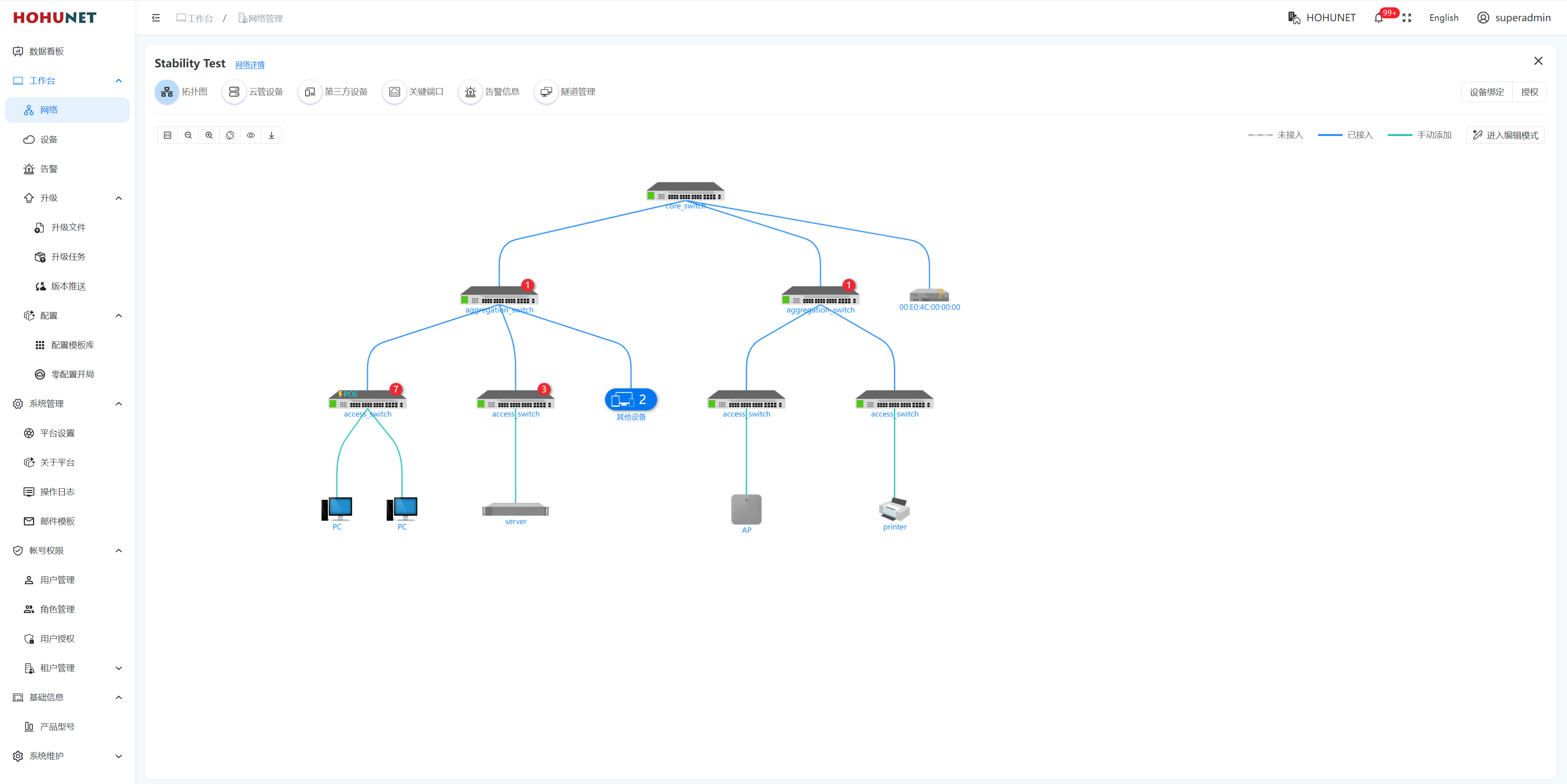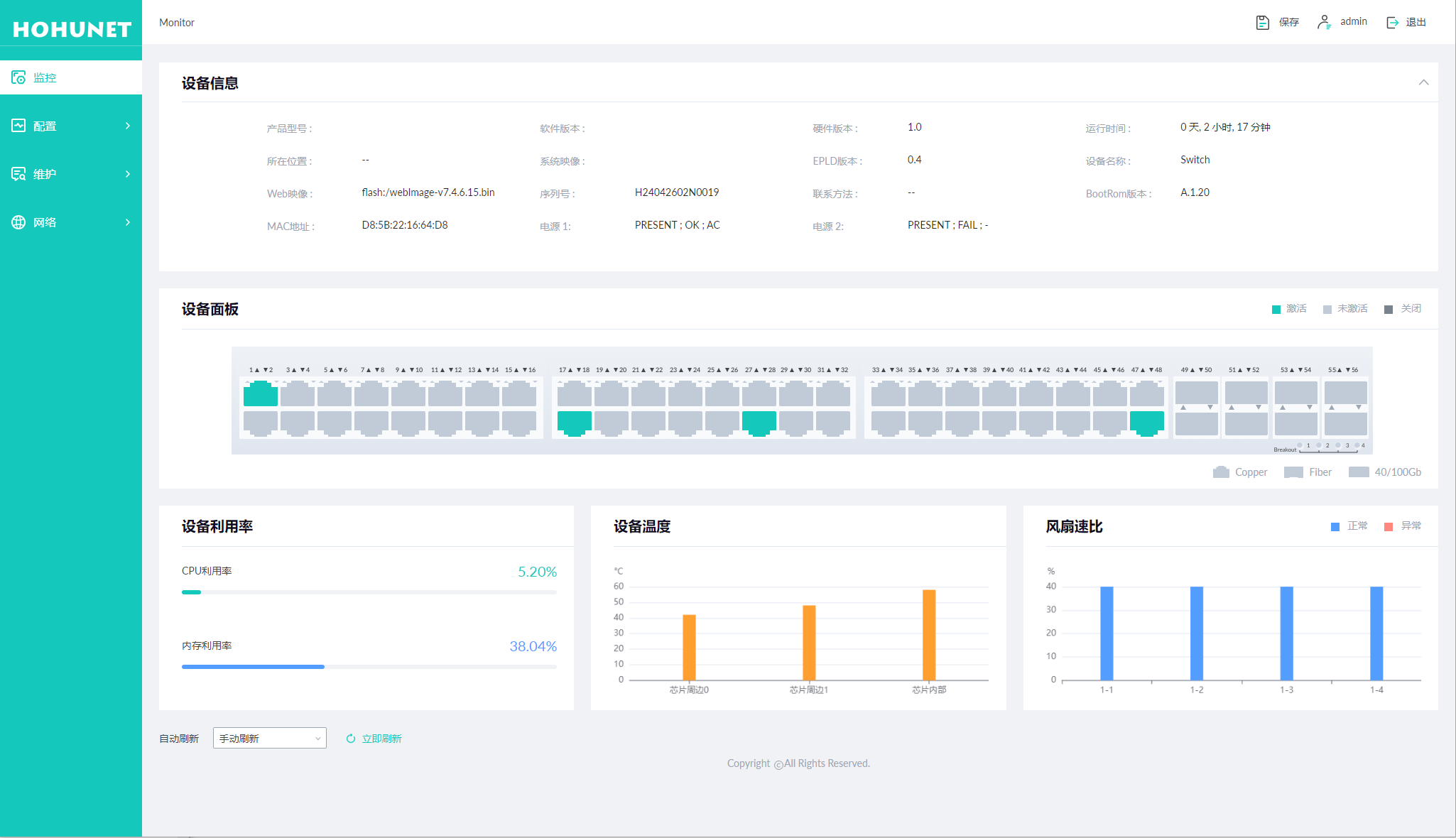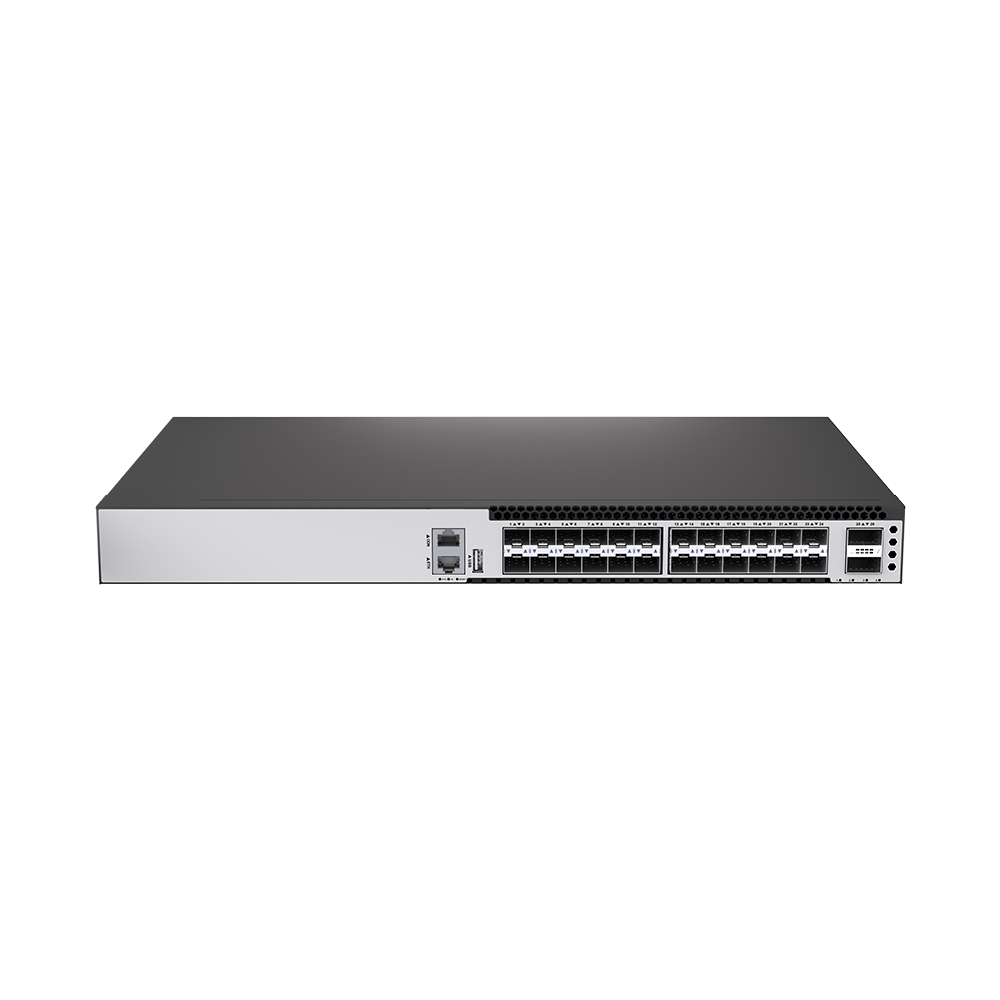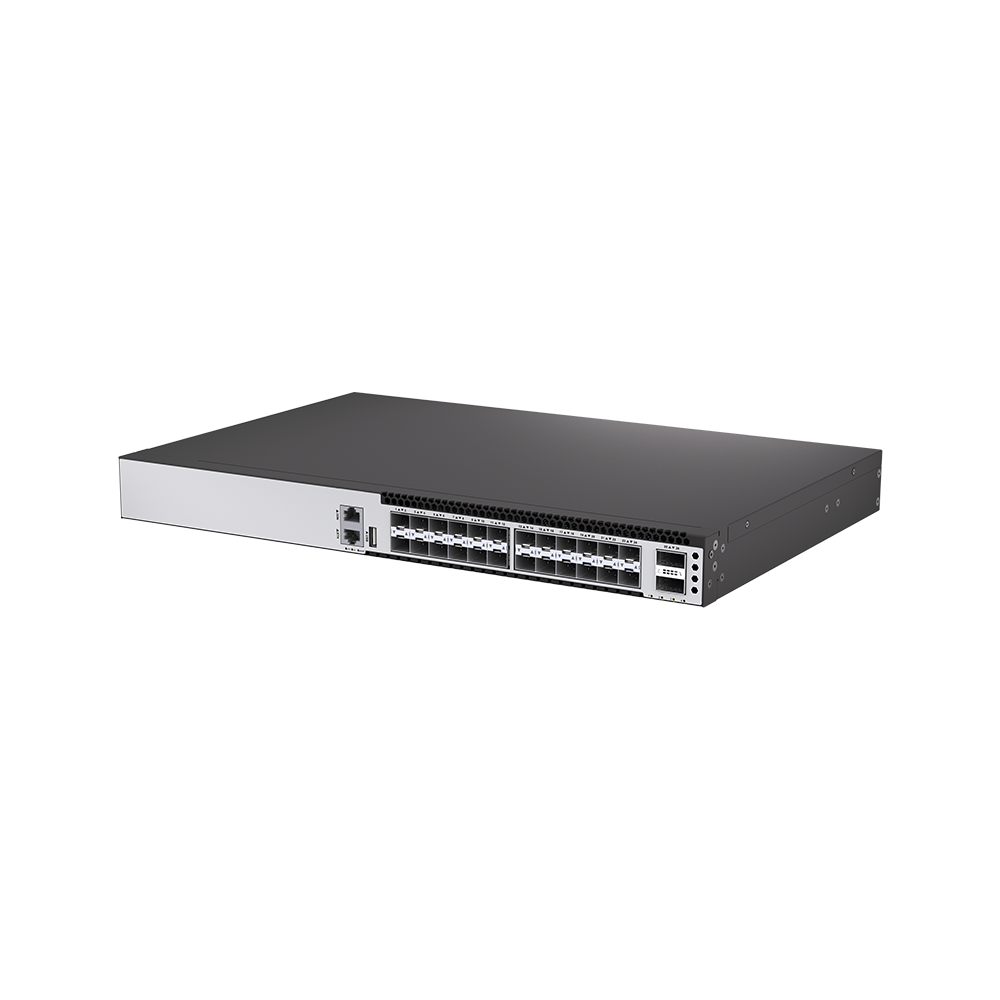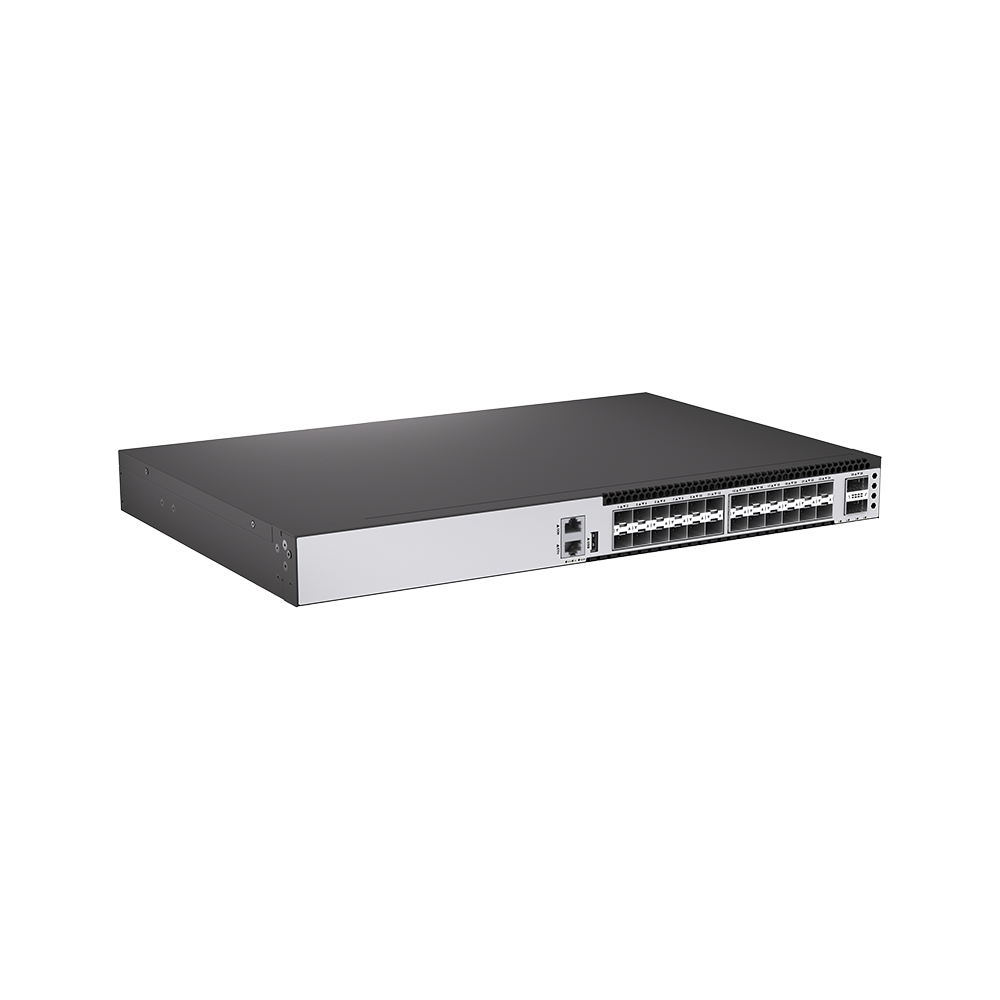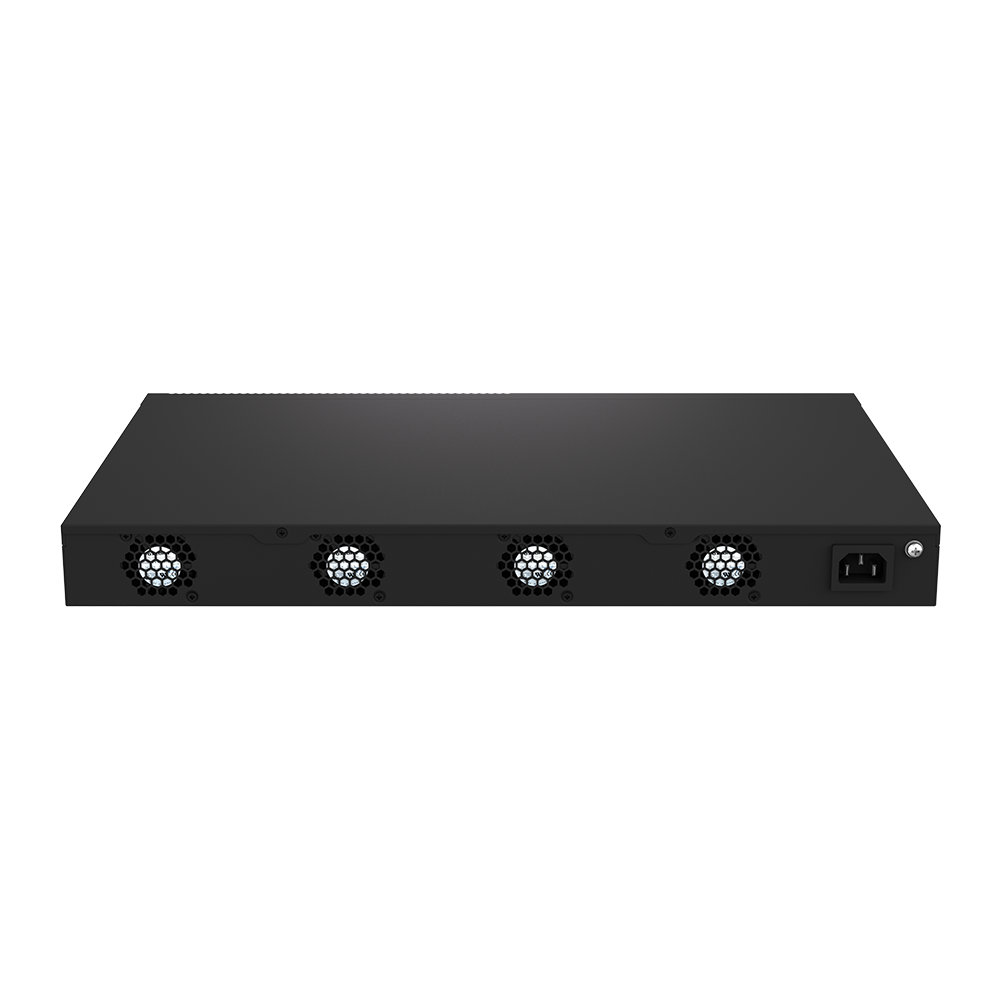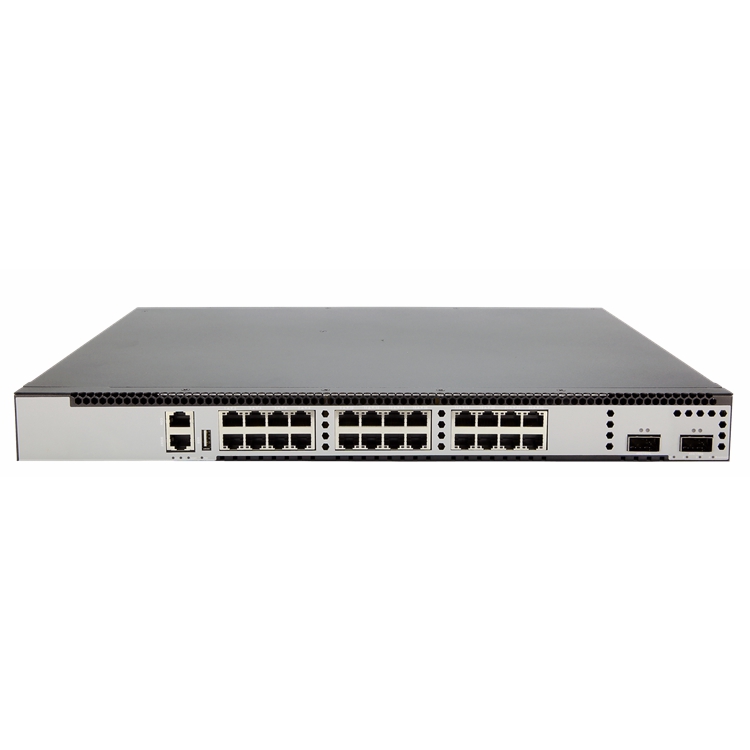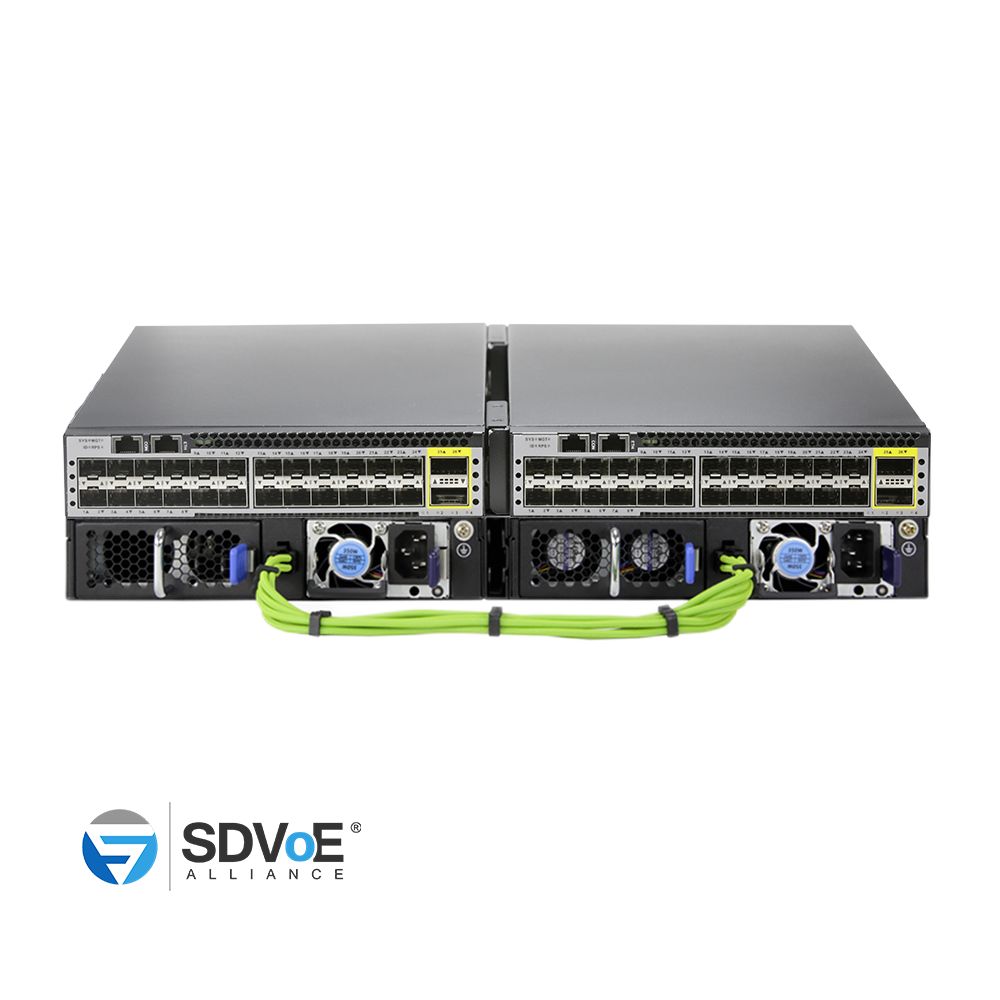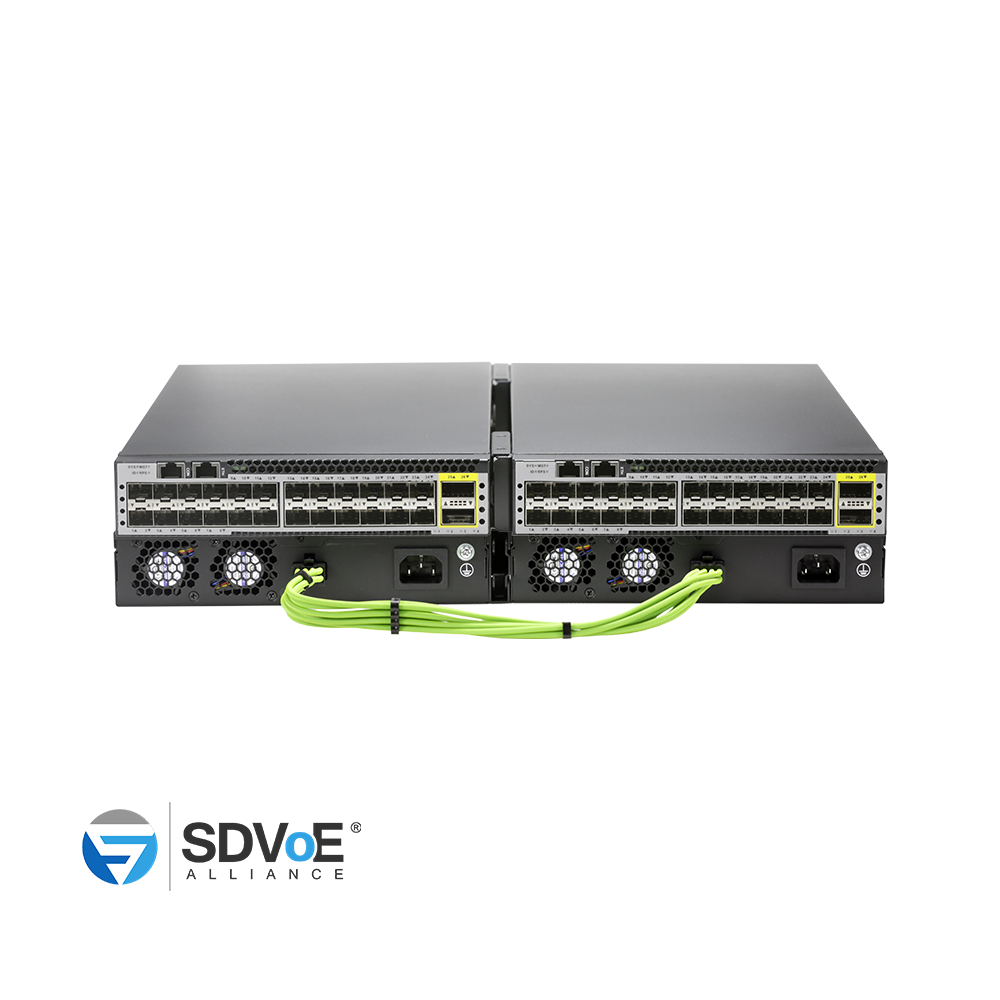| 类 |
子类 |
特性 |
描述 |
EB |
MS |
MA |
说明 |
| Ethernet basic features |
Ethernet |
interface |
Ethernet interface operating modes(full duplex, half duplex, and auto-negotiation) |
◯ |
◯ |
◯ |
|
| Ethernet interface operating rates |
◯ |
◯ |
◯ |
|
| Jumbo Frame |
◯ |
◯ |
◯ |
|
| port-xconnect |
◯ |
◯ |
◯ |
|
| Flow-control |
Flow-control tx/rx |
◯ |
◯ |
◯ |
|
| storm-control |
Port based storm-control |
◯ |
◯ |
◯ |
|
| VLAN based storm-control |
◯ |
◯ |
◯ |
|
| Port-block |
Port-block(know/unknown unicast; know/unknown multicast/broadcast) |
◯ |
◯ |
◯ |
|
| Port-isolate |
L2/L3/All Port-isolate |
◯ |
◯ |
◯ |
|
| Uni-direction isolate |
◯ |
◯ |
◯ |
|
| L2 Protocol Tunnel |
L2 Protocol Tunnel(support CFM/DOT1X/SLOW-PROTO/STP |
◯ |
◯ |
◯ |
|
| Forward mode |
Store-and-forward |
◯ |
◯ |
◯ |
|
| Cut-through |
◯ |
◯ |
◯ |
|
| VLAN |
VLAN Access mode |
Access/Trunk |
◯ |
◯ |
◯ |
|
| Default VLAN |
◯ |
◯ |
◯ |
|
| VLAN Classification |
VLAN Classification(port based/mac based/IP based/protocol based) |
◯ |
◯ |
◯ |
|
| QinQ |
Basic QinQ |
◯ |
◯ |
◯ |
|
| Selective QinQ |
◯ |
◯ |
◯ |
|
| VLAN Mapping(1:1 VLAN Translation) |
◯ |
◯ |
◯ |
|
| VLAN Statistics |
VLAN Statistics |
◯ |
◯ |
◯ |
|
| Private VLAN |
Private VLAN |
◯ |
◯ |
◯ |
|
| Voice VLAN |
Voice VLAN |
◯ |
◯ |
◯ |
|
| Guest VLAN |
Guest VLAN |
◯ |
◯ |
◯ |
|
| MAC |
MAC Address Table |
Automatic learning and aging of MAC addresses |
◯ |
◯ |
◯ |
|
| Hardware Learning |
◯ |
◯ |
◯ |
|
| Static and dynamic MAC address entries |
◯ |
◯ |
◯ |
|
| Blackhole MAC |
◯ |
◯ |
◯ |
|
| MAC Flapping detect |
MAC Flapping detect |
◯ |
◯ |
◯ |
|
| Port Bridge |
Port Bridge |
◯ |
◯ |
◯ |
|
| LAG |
Link aggregation |
Static-LAG & LACP |
◯ |
◯ |
◯ |
|
| LAG load balance(SLB) |
◯ |
◯ |
◯ |
|
| LAG load balance(DLB) |
◯ |
◯ |
◯ |
|
| LAG load balance(RR) |
◯ |
◯ |
◯ |
|
| LAG Self-healing |
◯ |
◯ |
◯ |
|
| Link aggregation weighting |
◯ |
◯ |
◯ |
|
| Ethernet Ring protection features |
xSTP |
STP |
Spanning-Tree Protocol |
◯ |
◯ |
◯ |
|
| RSTP |
Rapid Spanning-Tree Protocol |
◯ |
◯ |
◯ |
|
| MSTP |
Multi-instance Spanning-Tree Protocol |
◯ |
◯ |
◯ |
|
| Spanning-Tree Protocol Protection |
BPDU Filter/Guard |
◯ |
◯ |
◯ |
|
| Root Guard |
◯ |
◯ |
◯ |
|
| Loop Guard |
◯ |
◯ |
◯ |
|
| Anti TC-BPDU attack |
◯ |
◯ |
◯ |
|
| ERPS |
ERPS |
Single ERPS ring |
◯ |
◯ |
◯ |
|
| tangent ERPS rings |
◯ |
◯ |
◯ |
|
| intersecting ERPS rings |
◯ |
◯ |
◯ |
|
| compatible with RRPP |
◯ |
◯ |
◯ |
|
| Loop back Detect |
Loop back Detect |
Loop back detection |
◯ |
◯ |
◯ |
|
| Layer2 Multicast |
Layer2 Multicast |
IGMP Snooping |
IGMPv1/v2/v3 Snooping |
◯ |
◯ |
◯ |
|
| Fast leave |
◯ |
◯ |
◯ |
|
| Static IGMP snooping group |
◯ |
◯ |
◯ |
|
| MVR |
MVR(Multicast VLAN Registration) |
◯ |
◯ |
◯ |
|
| IPv4 Forwarding |
ARP |
ARP |
Static and dynamic ARP entries |
◯ |
◯ |
◯ |
|
| Aging of ARP entries |
◯ |
◯ |
◯ |
|
| Gratuitous ARP |
◯ |
◯ |
◯ |
|
| ARP proxy |
basic ARP-Proxy |
◯ |
◯ |
◯ |
|
| local ARP-Proxy |
◯ |
◯ |
◯ |
|
| IPv4 Unicast Routing |
IPv4 Static Routes |
IPv4 Static Routes |
◯ |
◯ |
◯ |
|
| Black hole Routes |
◯ |
◯ |
◯ |
|
| co-work with IP SLA |
◯ |
◯ |
◯ |
|
| VRF(Virtual Routing and Forwarding) |
◯ |
◯ |
◯ |
|
| uRPF check |
◯ |
◯ |
◯ |
|
| RIP |
RIPv1/v2 |
◯ |
◯ |
◯ |
|
| OSPFv2 |
OSPFv2 |
X |
◯ |
◯ |
|
| IS-IS |
IS-IS |
X |
◯ |
◯ |
|
| BGP |
IBGP |
X |
◯ |
◯ |
|
| EBGP |
X |
◯ |
◯ |
|
| Route policy |
Route-map |
◯ |
◯ |
◯ |
|
| IPv4 prefix-list |
◯ |
◯ |
◯ |
|
| PBR |
PBR(Policy-based Routing) |
◯ |
◯ |
◯ |
|
| ICMP |
ICMP redirect |
◯ |
◯ |
◯ |
|
| ICMP unreachable |
◯ |
◯ |
◯ |
|
| ECMP |
ECMP(SLB) |
◯ |
◯ |
◯ |
|
| ECMP(DLB) |
◯ |
◯ |
◯ |
|
| ECMP(RR) |
◯ |
◯ |
◯ |
|
| ECMP Self-healing |
◯ |
◯ |
◯ |
|
| IPv4 Multicast Routing |
IGMP |
IGMPv1/v2/v3 |
◯ |
◯ |
◯ |
|
| IGMP-Proxy |
◯ |
◯ |
◯ |
|
| IGMP SSM Mapping |
◯ |
◯ |
◯ |
|
| PIM |
PIM-SM |
X |
◯ |
◯ |
|
| PIM-DM |
X |
◯ |
◯ |
|
| IPv6 Forwarding |
IPv6 Basic Protocol |
ICMPv6 |
ICMPv6 |
X |
◯ |
◯ |
|
| NDP |
NDP |
X |
◯ |
◯ |
|
| IPv6 Unicast Routing |
IPv6 Static Routes |
IPv6 Static Routes |
X |
◯ |
◯ |
|
| RIPng |
RIPng |
X |
◯ |
◯ |
|
| OSPFv3 |
OSPFv3 |
X |
◯ |
◯ |
|
| IS-IS |
IS-IS |
X |
◯ |
◯ |
|
| BGP4+ |
BGP4+ |
X |
◯ |
◯ |
|
| IPv6 Multicast Routing |
MLD v1/v2 |
MLD v1/v2 |
X |
◯ |
◯ |
|
| MLD v1/v2 Snooping |
MLD v1/v2 Snooping |
X |
◯ |
◯ |
|
| MVR6 |
MVR6 |
X |
◯ |
◯ |
|
| PIM-SM v6 |
PIM-SM v6 |
X |
◯ |
◯ |
|
| IP Tunnel |
IPv6 over IPv4 Tunnel |
IPv6 over IPv4 Tunnel |
X |
◯ |
◯ |
|
| 6to4 Tunnel |
6to4 Tunnel |
X |
◯ |
◯ |
|
| ISATAP Tunnel |
ISATAP Tunnel |
X |
◯ |
◯ |
|
| IPv6 Service |
DHCPv6 |
DHCPv6 Relay |
X |
◯ |
◯ |
|
| DHCPv6 Snooping |
X |
◯ |
◯ |
|
| IPv6 Prefix List |
IPv6 Prefix-list |
X |
◯ |
◯ |
|
| Device reliability features |
BFD |
BFD |
BFD for Static route |
X |
◯ |
◯ |
|
| BFD for OSPFv2 |
X |
◯ |
◯ |
|
| BFD for VRRP/Track |
X |
◯ |
◯ |
|
| BFD for PBR |
X |
◯ |
◯ |
|
| VRRP |
VRRP |
VRRP |
◯ |
◯ |
◯ |
|
| Track for VRRP |
◯ |
◯ |
◯ |
|
| Smart Link |
Smart Link |
multi-instance |
◯ |
◯ |
◯ |
|
| load balance |
◯ |
◯ |
◯ |
|
| Multi-Link |
◯ |
◯ |
◯ |
|
| Monitor-link |
◯ |
◯ |
◯ |
|
| MLAG |
MLAG |
MLAG basic |
◯ |
◯ |
◯ |
|
| MLAG orphan Port |
◯ |
◯ |
◯ |
|
| Stacking |
Stacking |
Maximum number of stacked devices: 8
Stack port: Any port or AGG |
◯ |
◯ |
◯ |
需要ST license支持 |
| ethernet OAM |
EFM |
EFM (802.3ah) |
Auto detection |
X |
◯ |
◯ |
|
| Network fault detection |
X |
◯ |
◯ |
|
| Network fault handle |
X |
◯ |
◯ |
|
| remote loop back |
X |
◯ |
◯ |
|
| CFM |
CFM (802.1ag) |
Hardware CCM detect |
X |
◯ |
◯ |
|
| MAC Ping |
X |
◯ |
◯ |
|
| MAC Trace |
X |
◯ |
◯ |
|
| Y.1731 |
Y.1731 |
Loss measure(LM) |
X |
◯ |
◯ |
BigFlow和SerdesX平台不支持 |
| Latency and Jitter measure(DM) |
X |
◯ |
◯ |
|
| PoE features |
PoE |
System Power management |
Power supply on-spot detection |
◯ |
◯ |
◯ |
|
| Power supply capability detection |
◯ |
◯ |
◯ |
|
| Power capability auto configuration (PSE) |
◯ |
◯ |
◯ |
|
| Power Supply Management |
Legacy PD detection |
◯ |
◯ |
◯ |
|
| PD max power management |
◯ |
◯ |
◯ |
|
| PD priority management |
◯ |
◯ |
◯ |
|
| Power Supply Task Plan management(Not ready) |
◯ |
◯ |
◯ |
|
| PD Mandatory power supply |
◯ |
◯ |
◯ |
|
| operations management |
PSE log |
◯ |
◯ |
◯ |
|
| PSE Chipset temperature inquire |
◯ |
◯ |
◯ |
|
| PSE firmware update |
◯ |
◯ |
◯ |
|
| QoS features |
QoS |
Traffic classification |
Traffic classification based on COS/DSCP (simple classification) |
◯ |
◯ |
◯ |
|
| Traffic classification based on ACL ( complex classification) |
◯ |
◯ |
◯ |
|
| Traffic classification based on inner header of the tunnel packets |
◯ |
◯ |
◯ |
|
| Traffic behaviors |
Queue scheduling |
◯ |
◯ |
◯ |
|
| Remark the priority fields(COS/DSCP) of the packet based on ACL |
◯ |
◯ |
◯ |
|
| Remark the priority fields(COS/DSCP) of the packet based on Table Map |
◯ |
◯ |
◯ |
|
| Flow redirection |
◯ |
◯ |
◯ |
|
| Flow mirror |
◯ |
◯ |
◯ |
|
| Traffic policing |
Traffic policing based on direction(in/out) of Port |
◯ |
◯ |
◯ |
|
| Traffic policing based on direction(in/out) of VLAN |
◯ |
◯ |
◯ |
|
| Traffic policing based on direction(in/out) of flow |
◯ |
◯ |
◯ |
|
| Traffic policing based on direction(in/out) of aggregated flow |
◯ |
◯ |
◯ |
|
| Traffic shaping |
Queue based traffic shaping |
◯ |
◯ |
◯ |
|
| Port based traffic shaping |
◯ |
◯ |
◯ |
|
| Congestion management |
SP(Strict Priority)scheduling |
◯ |
◯ |
◯ |
|
| WDRR(Weighted Deficit Round Robin)scheduling |
◯ |
◯ |
◯ |
SerdesX平台不支持 |
| SP + WDRR mixed scheduling |
◯ |
◯ |
◯ |
SerdesX平台不支持 |
| Congestion avoidance |
TD(Tail Drop) |
◯ |
◯ |
◯ |
|
| WRED(Weighted Random Early Detection) |
◯ |
◯ |
◯ |
|
| Traffic statistics |
Packet counts and bytes statistics based on traffic classification |
◯ |
◯ |
◯ |
|
| Packet counts and bytes statistics based on the color after traffic policing |
◯ |
◯ |
◯ |
|
| Forwarded and discarded packet counts and bytes statistics |
◯ |
◯ |
◯ |
|
| ECN (Explicit congestion |
ECN tags based on Tail Drop |
◯ |
◯ |
◯ |
SerdesX平台不支持 |
| ECN tags based on WRED |
◯ |
◯ |
◯ |
|
| Data Center |
VARP |
Virtual gateway |
VARP(Virtual-ARP) |
◯ |
◯ |
◯ |
|
| VARP subnet |
◯ |
◯ |
◯ |
|
| Tunnel |
VxLAN |
Manual configure VxLAN tunnel |
◯ |
◯ |
◯ |
|
| VxLAN distributed gateway |
◯ |
◯ |
◯ |
|
| VxLAN active-active access |
◯ |
◯ |
◯ |
|
| Interconnect across Data Centers based on VxLAN |
◯ |
◯ |
◯ |
|
| Edit DSCP in VxLan outer header |
◯ |
◯ |
◯ |
|
| BGP EVPN |
◯ |
◯ |
◯ |
|
| Support to enable/disable overlay split horizon per-VNI |
◯ |
◯ |
◯ |
|
| GRE Tunnel |
GRE Tunnel |
◯ |
◯ |
◯ |
|
| NVGRE Tunnel |
NVGRE Tunnel |
◯ |
◯ |
◯ |
|
| GENEVE Tunnel |
GENEVE Tunnel |
◯ |
◯ |
◯ |
|
| DCB |
DCBX |
LLDP support DCBX TLV |
◯ |
◯ |
◯ |
|
| PFC |
PFC |
◯ |
◯ |
◯ |
|
| Metro Feature |
MPLS |
LDP |
LDP |
X |
X |
◯ |
|
| MPLS Forwarding |
MPLS Forwarding |
X |
X |
◯ |
|
| VPWS |
VPWS (L2VPN) |
X |
X |
◯ |
|
| VPLS |
VPLS (L2VPN) |
X |
X |
◯ |
|
| L3VPN |
L3VPN |
X |
X |
◯ |
|
| MPLS OAM |
MPLS OAM |
X |
X |
◯ |
|
| MPLS Stats |
MPLS Stats |
X |
X |
◯ |
|
| ACL |
ACL |
X |
X |
◯ |
|
| Qos |
Qos |
X |
X |
◯ |
|
| Security and management |
System Security |
SSH |
SSHv1/v2 |
◯ |
◯ |
◯ |
|
| RSA Key generation |
◯ |
◯ |
◯ |
|
| RADIUS |
RADIUS |
◯ |
◯ |
◯ |
|
| TACAS+ |
TACAS+ |
◯ |
◯ |
◯ |
|
| AAA |
Authentication |
◯ |
◯ |
◯ |
|
| Authorization |
◯ |
◯ |
◯ |
|
| Accounting |
◯ |
◯ |
◯ |
|
| Dot1x |
Port based dot1x |
◯ |
◯ |
◯ |
|
| MAC based dot1x |
◯ |
◯ |
◯ |
|
| Guest VLAN |
◯ |
◯ |
◯ |
|
| ACL |
MAC/IP ACL |
◯ |
◯ |
◯ |
|
| Basic Mode ACL |
◯ |
◯ |
◯ |
|
| Port-group ACL |
◯ |
◯ |
◯ |
|
| VLAN-group ACL |
◯ |
◯ |
◯ |
|
| IPv6 ACL |
◯ |
◯ |
◯ |
|
| ACL UDF |
◯ |
◯ |
◯ |
|
| Time Range |
◯ |
◯ |
◯ |
|
| ARP Inspection |
ARP Inspection |
◯ |
◯ |
◯ |
|
| IP Source Guard |
IP Source Guard |
◯ |
◯ |
◯ |
|
| Port Security |
Limitation on MAC address learning on interface |
◯ |
◯ |
◯ |
|
| VLAN Security |
Limitation on MAC address learning on VLAN |
◯ |
◯ |
◯ |
|
| Control Plane Policy (COPP) |
Black list/wihte list |
◯ |
◯ |
◯ |
|
| Rate limit |
◯ |
◯ |
◯ |
|
| CPU Traffic Limit |
CPU Traffic Limit |
◯ |
◯ |
◯ |
|
| Prevent DDOS attack |
Prevent DDOS attack (ICMP Flood/Smurf/Fraggle/LAND/SYN Flood) |
◯ |
◯ |
◯ |
|
| Login filter |
Telnet/SSH ACL filtering |
◯ |
◯ |
◯ |
|
| Telnet/SSH IPv6 ACL filtering |
◯ |
◯ |
◯ |
|
| MAC Security |
MacSec(802.1AE) |
◯ |
◯ |
◯ |
BigFlow平台不支持 |
| Link-Flapping detection |
Link-Flapping detection |
◯ |
◯ |
◯ |
|
| Network Management |
DHCP |
DHCP Server |
◯ |
◯ |
◯ |
|
| DHCP Relay |
◯ |
◯ |
◯ |
|
| DHCP Snooping |
◯ |
◯ |
◯ |
|
| DHCP Client |
◯ |
◯ |
◯ |
|
| DHCP Option82 |
◯ |
◯ |
◯ |
|
| DHCP Option252 |
◯ |
◯ |
◯ |
|
| RMON |
RMON |
◯ |
◯ |
◯ |
|
| sFlow |
sFlow v4/v5 |
◯ |
◯ |
◯ |
|
| IP SLA |
IP SLA |
◯ |
◯ |
◯ |
|
| IPFIX |
IPFIX |
◯ |
◯ |
◯ |
|
| EFD |
Elephant Flow Detection |
◯ |
◯ |
◯ |
BigFlow平台不支持 |
| NTP |
NTP(Network Time Protocol) |
◯ |
◯ |
◯ |
|
| PTP(IEEE 1588) |
TC(Support P2P/E2E、Ethernet/Udp Transport) |
◯ |
◯ |
◯ |
|
| BC/OC(Support OneStep/TwoStep、Request-response/Peer-delay Ethernet/Udp Transport) |
◯ |
◯ |
◯ |
|
| Err-disable |
Err-disable detection and recovery |
◯ |
◯ |
◯ |
|
| DNS |
Static DNS Client |
◯ |
◯ |
◯ |
|
| LLDP |
LLDP |
◯ |
◯ |
◯ |
|
| Terminal Services |
Command Line Interface |
Configurations through CLI (Command Line Interface) |
◯ |
◯ |
◯ |
|
| Help information |
Banner configuration |
◯ |
◯ |
◯ |
|
| Help information in English |
◯ |
◯ |
◯ |
|
| Terminal service |
Vty Terminal service |
◯ |
◯ |
◯ |
|
| Console Terminal service |
◯ |
◯ |
◯ |
|
| Management interface |
In-band management interface and configuration |
◯ |
◯ |
◯ |
|
| Out-band management interface and configuration |
◯ |
◯ |
◯ |
|
| Configuration and maintenance |
Configuration Management |
SNMP |
Network management based on SNMPv1/v2c/v3 |
◯ |
◯ |
◯ |
|
| Public and private MIB |
◯ |
◯ |
◯ |
|
| Public and private Trap |
◯ |
◯ |
◯ |
|
| WEB |
Configuration and management based on WEB UI |
◯ |
◯ |
◯ |
|
| Cloud Management |
Automatic device connection management |
◯ |
◯ |
◯ |
Cloud Management需要与 DHCS 云管理系统配合使用;DHCS 可以部署在公共云上或私有环境中 |
| Zero-configuration deployment |
◯ |
◯ |
◯ |
| Automatic network topology |
◯ |
◯ |
◯ |
| Network monitoring and alarm notification |
◯ |
◯ |
◯ |
| Configuration and one-click rollback |
◯ |
◯ |
◯ |
| Cross-network tunneling connection to network device(web/ssh/telnet) |
◯ |
◯ |
◯ |
| Scheduled tasks deployment |
◯ |
◯ |
◯ |
| RPC-API |
Configuration and management based on RPC-API |
◯ |
◯ |
◯ |
|
| Smart Config |
Smart Config(Automatically configuration when system start) |
◯ |
◯ |
◯ |
|
| system profile configuration |
change the system specifications by choose different STM Profiles |
◯ |
◯ |
◯ |
|
| Restore factory default configuration |
Restore factory default configuration |
◯ |
◯ |
◯ |
|
| File System |
File system |
File system(support directory and file management) |
◯ |
◯ |
◯ |
|
| Upload and download |
Upload and download files through FTP or TFTP |
◯ |
◯ |
◯ |
|
| Upload and download files through Xmodem |
◯ |
◯ |
◯ |
|
| Debugging And Maintenance |
Debug |
per-module Debug features |
◯ |
◯ |
◯ |
|
| ICMP Debug |
◯ |
◯ |
◯ |
|
| BHM |
Software process monitor: BHM(Beat Heart Monitor) |
◯ |
◯ |
◯ |
|
| Hardware Watch Dog |
◯ |
◯ |
◯ |
|
| Log & alarm |
CPU usage display and alarm |
◯ |
◯ |
◯ |
|
| Memory usage display and alarm |
◯ |
◯ |
◯ |
|
| Device temperature, PSU, FAN, status display and alarm |
◯ |
◯ |
◯ |
|
| User operation logs |
◯ |
◯ |
◯ |
|
| Management of logs, alarms, and debugging information |
◯ |
◯ |
◯ |
|
| VCT |
VCT(Virtual Cable Test) |
◯ |
◯ |
◯ |
|
| system diagnostics |
Detailed Diagnostic-information collection |
◯ |
◯ |
◯ |
|
| Reboot |
Manual reboot |
◯ |
◯ |
◯ |
|
| Schedule Reboot |
◯ |
◯ |
◯ |
|
| Reboot Information logging |
◯ |
◯ |
◯ |
|
| network diagnostics |
Ping |
◯ |
◯ |
◯ |
|
| IPv6 Ping |
◯ |
◯ |
◯ |
|
| Trace route |
◯ |
◯ |
◯ |
|
| mirror |
Port mirror |
◯ |
◯ |
◯ |
|
| Flow mirror |
◯ |
◯ |
◯ |
|
| Remote mirror |
◯ |
◯ |
◯ |
|
| Multi-destination mirror(m:n) |
◯ |
◯ |
◯ |
|
| Use CPU as mirror source |
◯ |
◯ |
◯ |
|
| Use CPU as mirror destination and analyze packet |
◯ |
◯ |
◯ |
|
| ERSPAN |
◯ |
◯ |
◯ |
|
| CPU statistics |
To CPU/From CPU packets statistics |
◯ |
◯ |
◯ |
|
| L2 Ping |
layer2 network connectivity detection – L2Ping (MAC Ping/Trace) |
◯ |
◯ |
◯ |
|
| UDLD |
UDLD(Unidirectional Link Detection) |
◯ |
◯ |
◯ |
|
| unidirectional |
unidirectional forwarding of the fiber |
◯ |
◯ |
◯ |
|
| Loop back |
port loop back |
◯ |
◯ |
◯ |
|
| hardware loop back(internal/external) |
◯ |
◯ |
◯ |
|
| System time |
Time configuration |
◯ |
◯ |
◯ |
|
| Timezone |
◯ |
◯ |
◯ |
|
| Software |
System software upgrate |
Update via TFTP |
◯ |
◯ |
◯ |
|
| upgrate |
Uboot upgrate |
Uboot upgrate |
◯ |
◯ |
◯ |
|
